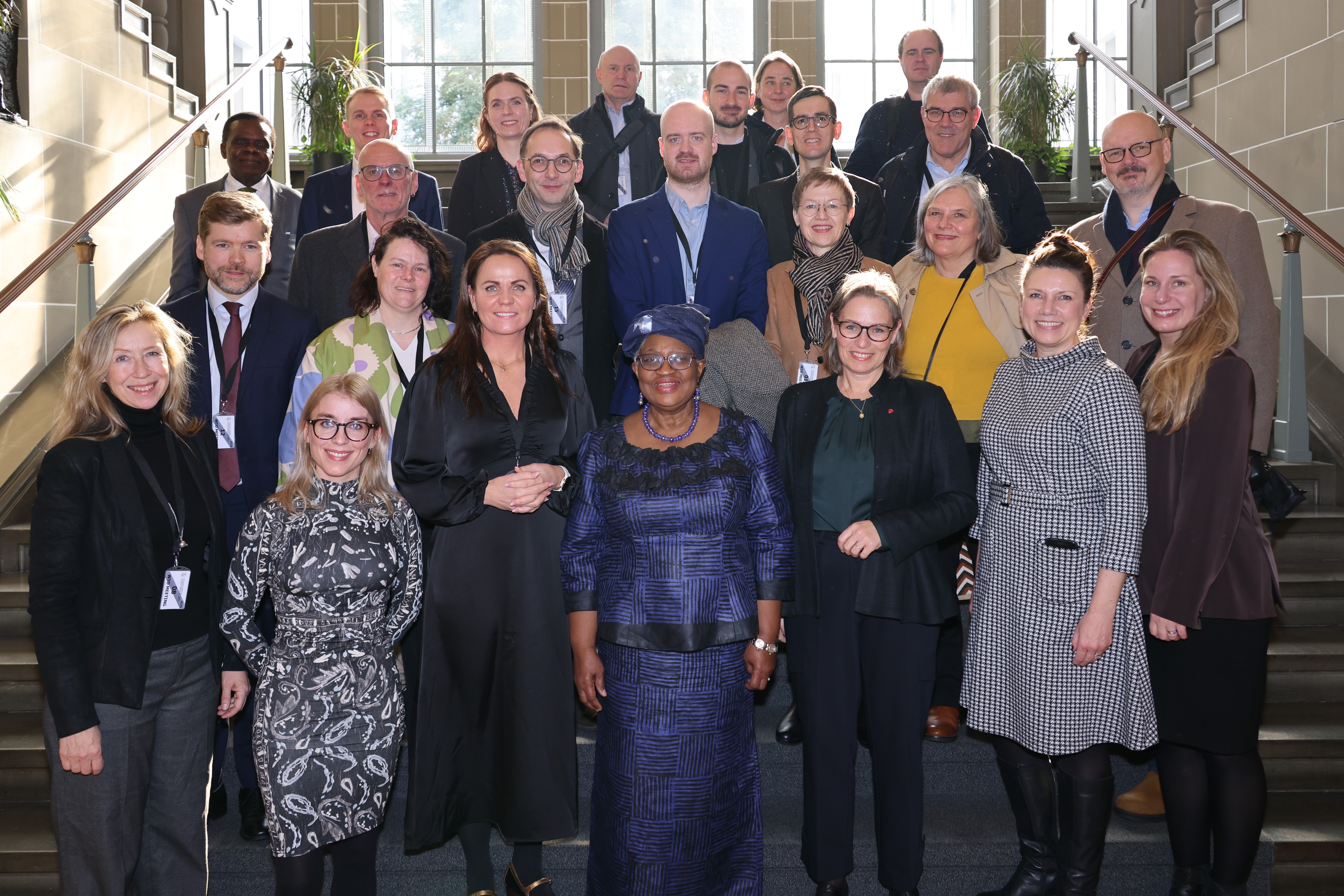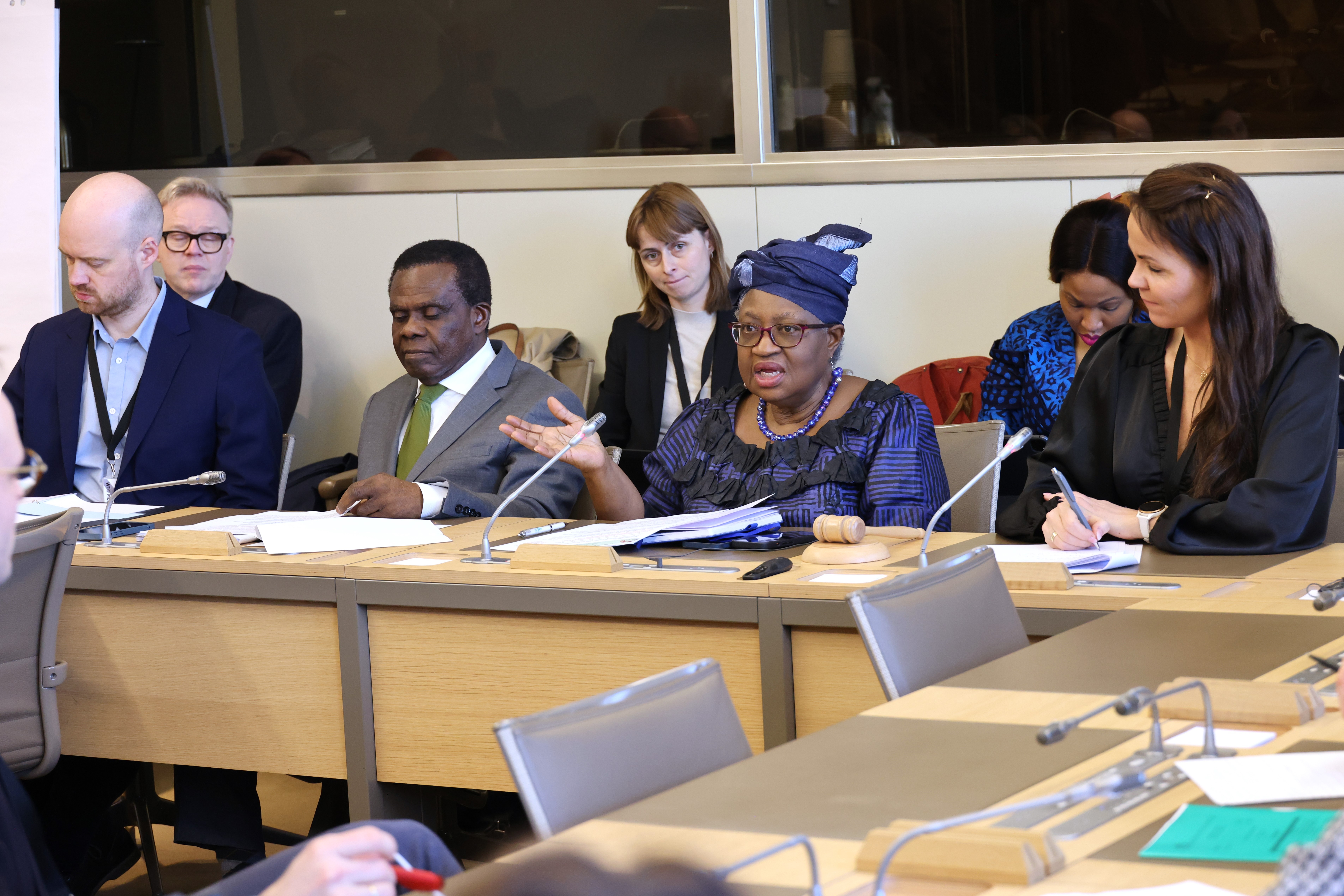
EFTA Parliamentary Committee and Consultative Committee meeting with WTO Director-General Dr Ngozi Okonjo-Iweala in Geneva.

EFTA Parliamentary Committee and Consultative Committee meeting with WTO Director-General Dr Ngozi Okonjo-Iweala in Geneva.
The EFTA Parliamentary Committee (EFTA PC) and the EFTA Consultative Committee (EFTA CC) convened on 28 and 29 January in Geneva to exchange views on multilateral, regional and bilateral trade.
The comprehensive meetings were co-chaired by Ms Ingibjörg Ólöf Isaksen (Icelandic Parliament) and Mr Halldór Oddsson (Icelandic Confederation of Labour) and covered a range of topics relevant to EFTA’s third-country agenda.
At a meeting with WTO Director-General Dr Ngozi Okonjo-Iweala, members discussed prospects for WTO reform, opportunities linked to green and digital trade, and the importance of supporting the rules-based trading system. She emphasised:
“We need trust to trade. The WTO goes beyond tariffs; it establishes standards on product safety, for example. Without shared rules, there would be chaos. The predictability of trade would be gone. That is why we need to stand for the WTO.”
The multilateral trade system was further discussed with the four EFTA States’ Permanent Representatives to the WTO. The Ambassadors briefed the committees on strategic priorities in the WTO context and expectations for the Ministerial Conference taking place in Cameroon in March 2026. The meeting provided the opportunity to reflect on how EFTA could be a driving force in upholding the system, which remains crucial for all four countries.
Transatlantic relations also featured on the agenda, where members engaged with Professor Manfred Elsig, Deputy Managing Director of the World Trade Institute. Discussions focused on the potential trade implications of President Trump’s second term and US–China relations. In this context, the EU’s evolving trade policy and quest for economic security amid geopolitical shifts was also examined with Mr Léon Delvaux, Director in DG Trade at the European Commission.

WTO Director-General Dr Ngozi Okonjo-Iweala.
As strong supporters of inclusive international trade, the EFTA parliamentarians and social partners exchanged views with Ms Pamela Coke-Hamilton, Executive Director of the International Trade Centre, on ways to strengthen the integration of small and medium-sized enterprises (SMEs) in global value chains:
“Lack of access to finance and knowledge makes it harder for SMEs to adopt new technologies and to digitise supply chains. But when they gain access, the results are tangible”, said Ms Coke-Hamilton, outlining some of the key challenges faced by SMEs in developing countries.
Finally, together with EFTA’s Committee on Third-Country Relations, members assessed the potential impact of President Trump’s trade measures on EFTA. They also reviewed the recently concluded negotiations with Thailand and Ukraine, and the outlook for negotiations in 2025.
As EFTA aims to conclude its negotiations with Malaysia in 2025, part of the programme zoomed in on opportunities in the Asia Pacific. The committees took stock of geopolitical rivalries and economic integration in the region with Dr Françoise Nicolas, Senior Advisor at the Center for Asian Studies. She underlined the trade opportunities with countries in the region, which were eager to diversify their relations beyond the United States and China.
Since a delegation of the parliamentarians and social partners will undertake a working visit to Kuala Lumpur and Kuching in April 2025 to provide support to EFTA’s ongoing negotiations, they were eager to hear more about the remaining work with EFTA’s Spokesperson, Mr Ove Christian Owe. Members also exchanged views on economic priorities and the main benefits of an agreement with Malaysia’s Ambassador to the WTO, Mr Syahril Syazli Ghazali.
The EFTA PC is a forum for parliamentarians from the four EFTA countries, while the EFTA CC brings together representatives of trade union confederations and employers’ associations in the four EFTA countries. The mission of both advisory bodies is to scrutinise and provide advice on the EFTA States’ trade relations with third countries, as well as on relations with the European Union through the implementation of the EEA Agreement. Both advisory bodies are vital platforms for dialogue and consultation on social, economic and political aspects of EFTA’s free trade agreements and the functioning of the European Economic Area.